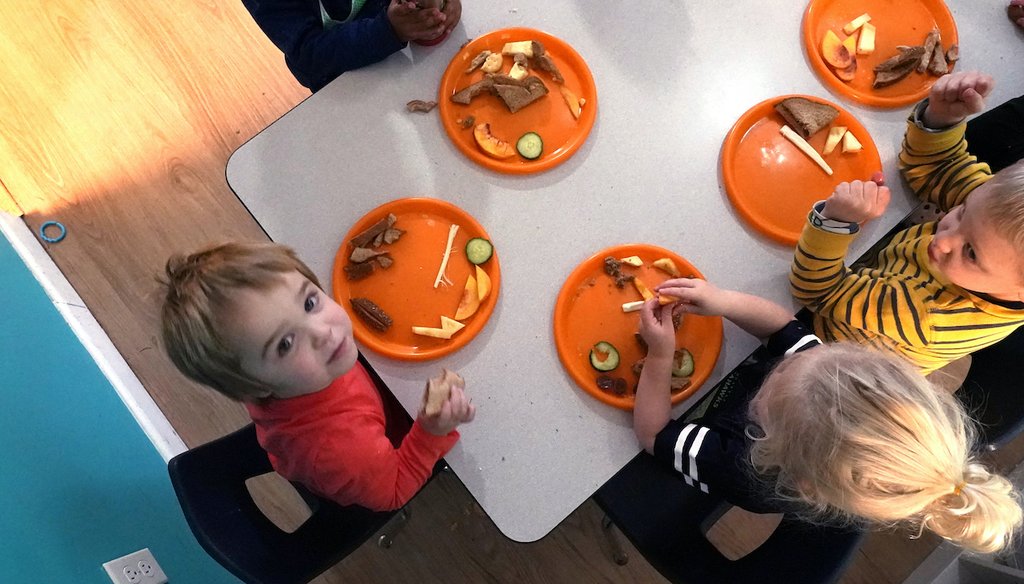

Our only agenda is to publish the truth so you can be an informed participant in democracy.
We need your help.


Preschool children eat lunch at a day care facility, Monday, Oct. 25, 2021, in Mountlake Terrace, Wash. (AP)
The figures cite a solid source for government spending on childcare. But other figures from the same source show a smaller discrepancy among the countries listed.
Economist and former U.S. Labor Secretary Robert Reich decried to his 1.4 million Twitter followers how relatively little the United States spends on early childhood care.
"Norway spends about $30,000 per child on early childhood care. Finland spends $23,000. Germany, $18,000. The U.S. spends $500 per child. In other words, 1/60th of what Norway spends on its toddlers. How do we expect to build a better future if we refuse to invest in our kids?" his Nov. 24 tweet read.
A reader asked us to check if Reich is right.
Reich, who served in the Clinton administration and is now at the University of California, Berkeley, cites a solid source on government spending figures, though there are other measures that show a smaller discrepancy.
The tweet was part of an opinion column Reich wrote in which he argued that America has "chosen to dramatically reduce poverty among the nation’s elderly but not among our children."
A spokeswoman confirmed that Reich used rounded numbers based on a table included with an Oct. 6 New York Times article.
Those figures show annual public spending per child on early childhood care, according to the Organization for Economic Cooperation and Development, and Elizabeth Davis and Aaron Sojourner for the Hamilton Project:
Norway: $29,726
Finland: $23,353
Germany: $18,656
United States: $500
The first three figures appear in the OECD’s report "Education at a Glance 2021." The spending figures are for early childhood education programs targeting children under 3 years that have an educational component of at least the equivalent of 2 hours per day and 100 days a year.
The report did not include a figure for the U.S. for children under age 3, but the Hamilton Project report, also cited as a source in the Times article, does, said one of the authors of the Hamilton Project report, University of Minnesota economist Aaron Sojourner. The figure for the U.S. is $500 per child. (The figure is $1,500 when preschoolers are included — children up to age 4.)
Joya Misra, professor of sociology and public policy and director of the Institute for Social Science Research at the University of Massachusetts Amherst, pointed to different figures from the OECD that show a smaller disparity between the U.S. and the other countries. They show yearly public social spending on childcare for three age spans — 0 to 2 years, the "pre primary" 3 to 5 age group, and the combined 0 to 5 — divided by the population of each group.
In round numbers, the total figures Misra pointed to were:
Norway: $12,000
Finland: $8,000
Germany: $7,000
United States: $3,000
Some economists emphasized that the figures show only what governments spend on child care, not how much in total is spent on child care.
"Americans have chosen mostly to pay for child care directly, while other countries have chosen to pay for child care indirectly via taxation," said Antony Davies, a Duquesne University professor and fellow at the conservative Foundation for Economic Education.
Jeffrey Miron, a Harvard University lecturer and director of economics studies at the libertarian Cato Institute, said government spending can’t be considered in a vacuum.
"What matters to children is how much is spent on them, adding government and private expenditure," he said. "If government provides a lot, private spending will cut back."
Reich said: "Norway spends about $30,000 per child on early childhood care, Finland spends $23,000, Germany $18,000" and the U.S. $500.
He accurately cited figures from a solid source, the Organization for Economic Cooperation and Development, but a different set of figures from the same organization shows a smaller discrepancy. The figures are for government spending, not total spending, on child care.
We rate the statement Mostly True.
Twitter, Robert Reich tweet (archived here), Nov. 24, 2021
Email, Robert Reich spokeswoman Aarin Walker, Dec. 1, 2021
Eurasia Review, "Robert Reich: Why Has America Rescued Our Elderly From Poverty But Not Our Children?", Nov. 29, 2021
New York Times, "How Other Nations Pay for Child Care. The U.S. Is an Outlier," Oct. 6, 2021
Organization for Economic Cooperation and Development, "Public spending on childcare and early education," accessed Nov. 30, 2021
Email, Organization for Economic Cooperation and Development media office, Dec. 6, 2021
Organization for Economic Cooperation and Development, "Education at a Glance 2021," (Table B2.3, column 6) accessed Dec. 9, 2021
Organization for Economic Cooperation and Development, "CED Policy Brief: Public Investment in Childcare and Early Education Policies: Europe vs. United States," Nov. 11, 2020
Organization for Economic Cooperation and Development, "Public spending on childcare and early education," accessed Dec. 1, 2021
The Hamilton Project, "Increasing Federal Investment in Children’s Early Care and Education to Raise Quality, Access, and Affordability," May 2021
Email, Duquesne University economics professor Antony Davies, a fellow at the Foundation for Economic Education, Dec. 1, 2021
Email, Jeffrey Miron, senior lecturer and director of undergraduate studies in the Department of Economics at Harvard University, and director of economics studies at the Cato Institute, Dec. 1, 2021
Email, Joya Misra, professor of sociology and public policy and director of the Institute For Social Science Research at the University of Massachusetts Amherst, Dec. 1, 2021
Email, Aaron Sojourner, labor economist and professor of management, University of Minnesota, Dec. 10, 2021
In a world of wild talk and fake news, help us stand up for the facts.
